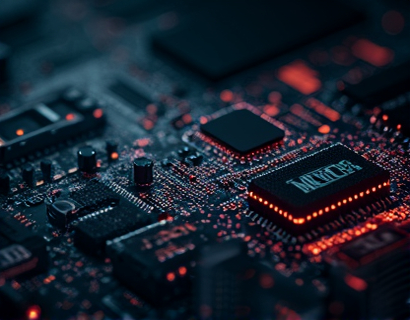Smart Contract Powered Payout Automation: Revolutionizing Financial Obligations for Businesses
In the rapidly evolving landscape of FinTech, smart contract technology has emerged as a game-changer, particularly in the realm of financial management. This innovative approach leverages blockchain's inherent properties to automate and secure the distribution of dividends, earnings, and scheduled payments. By doing so, it ensures transactions are not only secure and transparent but also highly efficient, significantly reducing the administrative burden on businesses. This article delves into how smart contract powered payout automation is transforming the way companies manage their financial obligations, offering a glimpse into a future where financial management is streamlined and reliable.
The Basics of Smart Contracts
Before exploring the specific applications, it's essential to understand what smart contracts are. A smart contract is a self-executing contract with the terms of the agreement directly written into code. These contracts run on a blockchain, a decentralized ledger that records all transactions across a network of computers. The code defines the rules and conditions under which the contract will execute, ensuring that all parties adhere to the agreed terms without the need for intermediaries.
One of the key features of smart contracts is their immutability. Once deployed, the terms of the contract cannot be altered, which adds a layer of trust and security to the transaction process. This is particularly valuable in financial obligations where consistency and reliability are paramount.
Automating Dividend Distribution
One of the most impactful applications of smart contract technology is in the automation of dividend distribution. Traditional dividend payouts involve multiple steps, including calculation, approval, and disbursement, each prone to delays and errors. With smart contracts, these processes can be automated end-to-end.
For instance, a company can program a smart contract to automatically calculate and distribute dividends to shareholders based on predefined criteria, such as the number of shares owned and the profitability of the company. Once the conditions are met, the contract executes the payment instantly and records the transaction on the blockchain, providing a transparent and verifiable record.
This automation not only speeds up the process but also reduces the risk of human error and fraud. Shareholders can have real-time access to the status of their dividends, enhancing transparency and trust in the company's financial practices.
Streamlining Earnings Distribution
Earnings distribution, particularly in the context of partnerships and joint ventures, can be complex and time-consuming. Smart contracts offer a solution by automating the distribution of earnings based on agreed-upon ratios or performance metrics.
For example, in a business partnership, the smart contract can be programmed to distribute earnings according to the percentage of ownership or contributions made by each partner. As soon as the earnings period ends and the profit is calculated, the contract automatically executes the distribution. This ensures that each party receives their share promptly and accurately, eliminating the need for manual calculations and negotiations.
Moreover, the use of smart contracts in earnings distribution can help prevent disputes by providing a clear, immutable record of the distribution process. This transparency can foster better relationships among partners and stakeholders, as everyone has access to the same information.
Automating Scheduled Payments
Scheduled payments, such as salaries, rent, and utility bills, are a routine part of business operations. Traditional methods often involve manual processing, which can lead to delays and errors. Smart contracts can automate these payments, ensuring they are made on time and in full.
For instance, a company can set up a smart contract to automatically transfer funds to suppliers or employees on specific dates. The contract can be programmed to check for the necessary conditions, such as the completion of work or the passage of a certain date, before initiating the payment. Once the conditions are met, the payment is executed and recorded on the blockchain, providing a tamper-proof record of the transaction.
This automation not only saves time and reduces the risk of errors but also improves cash flow management. Businesses can better plan their financial activities, knowing that payments will be processed without delay.
Enhancing Financial Control and Compliance
Smart contract powered payout automation goes beyond just efficiency; it also enhances financial control and compliance. By automating financial transactions, businesses can gain better visibility into their cash flows and financial obligations.
For example, smart contracts can be designed to trigger alerts or reports when certain financial thresholds are reached, such as low cash reserves or upcoming payment deadlines. This real-time monitoring helps businesses make informed decisions and take proactive measures to manage their finances effectively.
Additionally, the transparency and immutability of blockchain technology ensure that all financial transactions are compliant with regulatory requirements. This is particularly important for industries that are heavily regulated, such as finance and healthcare. Smart contracts can be programmed to adhere to specific compliance rules, reducing the risk of non-compliance and associated penalties.
Case Studies and Real-World Applications
Several companies have already begun to leverage smart contract technology for payout automation, achieving significant benefits.
One notable example is a major multinational corporation that implemented a smart contract system for distributing bonuses to its employees. The traditional process involved multiple steps, including approval from management, calculation of bonuses, and bank transfers. By using smart contracts, the company reduced the processing time from several weeks to mere minutes. Employees received their bonuses promptly, and the company saved on administrative costs and reduced the risk of errors.
Another example is a decentralized finance (DeFi) platform that uses smart contracts to automate the distribution of interest earnings to depositors. The platform ensures that interest is calculated and distributed based on predefined parameters, providing depositors with a transparent and reliable way to earn returns on their investments.
Challenges and Considerations
While the benefits of smart contract powered payout automation are clear, there are several challenges and considerations that businesses should be aware of.
First, the adoption of smart contracts requires a certain level of technical expertise. Businesses need to understand the underlying blockchain technology and how to program and deploy smart contracts effectively. This may require investing in training or hiring specialists with the necessary skills.
Second, while blockchain technology is highly secure, it is not immune to all risks. Smart contracts can have bugs or vulnerabilities that, if exploited, could lead to unintended consequences. Therefore, thorough testing and auditing of smart contracts are essential to ensure their reliability and security.
Third, regulatory frameworks for smart contracts are still evolving. Businesses should stay informed about the legal status of smart contracts in their jurisdiction and ensure compliance with relevant laws and regulations.
Future Prospects
The potential for smart contract powered payout automation is vast, with numerous areas where it can be further applied and improved. As blockchain technology continues to mature, we can expect to see more sophisticated and user-friendly smart contract platforms emerge.
One area of growth is the integration of smart contracts with other FinTech solutions, such as artificial intelligence and machine learning. This could lead to more intelligent and adaptive financial management systems that can predict and respond to financial events in real-time.
Additionally, the development of cross-chain interoperability will enable smart contracts to operate across different blockchain networks, expanding their utility and reach. This could facilitate more complex and global financial transactions, opening up new opportunities for businesses operating in multiple regions.
Conclusion
Smart contract powered payout automation represents a significant advancement in financial management for businesses. By automating the distribution of dividends, earnings, and scheduled payments, this technology ensures secure, transparent, and efficient transactions. It not only streamlines financial operations but also enhances financial control and compliance, providing businesses with a competitive edge in today's fast-paced market.
As the technology continues to evolve, businesses should consider integrating smart contracts into their financial processes to reap the benefits of automation and innovation. The future of financial management is here, and it is powered by smart contracts.











































